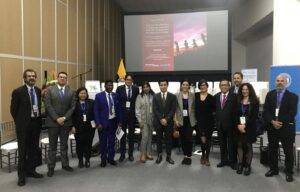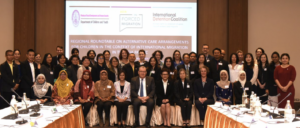Written by Silvia Gomez, IDC Global Advocacy Coordinator
Since its inception, IDC has prioritised supporting the development of communities of practice using peer learning as a methodology that facilitates the sharing of ideas, experiences, knowledge, and challenges towards developing, sustaining and scaling up alternatives to immigration detention.
Through more than a decade of sustained collaboration with government actors, civil society organisations, IDC members and the UN, IDC has witnessed how peer learning supports change, accelerates progress, and consolidates rights-based solutions to complex migration governance challenges, as well as encourages ongoing support among stakeholders.
As a global coalition, IDC supports and facilitates several peer learning platforms on alternatives to detention at local, national and regional levels, as well as cross-regional and global levels. The success of this methodology in supporting government actors at different levels has led to consolidating peer learning as a methodology of work in several fora, including as part of the global architecture on migration. The IMRF Progress Declaration, agreed upon by the UN General Assembly in 2022, includes peer learning as one of the key lines of work to advance implementation of the Global Compact for Migration (GCM) (see paragraph 72).
IDC’s History of Peer Learning at the Global Level
In the aftermath of the adoption of the GCM in 2018, IDC, in collaboration with UNICEF, started exploring and testing with a group of champion States and stakeholders how a cross-regional peer learning platform could support in accelerating change and progress in ending child immigration detention at the national level. The 2020 UN Secretary General Report on Implementation of the GCM highlighted this pioneering initiative (see paragraph 48).

Partially as a result of this process, and since 2020, the UN Network on Migration, through its Work Stream on Alternatives to Detention, co-led by IDC, UNHCR and UNICEF, has hosted 3 global peer learning exchanges in collaboration with the governments of Portugal, Thailand, Colombia, Ghana, and Nigeria. These exchanges, held under Chatham House rules, have been attended by 36 governments across regions and gathered representatives from the relevant technical and decision-making departments (see further information in the reports of the global peer learning exchanges). With a clear focus on national level change, and under the leadership of IDC, the Work Stream has also facilitated peer learning discussions to showcase how successful collaboration between governments and civil society on the ground looks like.
IDC has been able to observe how peer learning helps to:
- increase States’ confidence to discuss approaches towards migration governance without immigration detention and to work on alternatives to detention by showcasing promising and best practice, sharing challenges and learnings, co-creating solutions and identifying opportunities for change and progress
- create multi-stakeholder dialogue in a space of trust between governments, local authorities, civil society, UN actors, IDC members, grassroots and experts with lived experience (whole of society)
- support government structures in connecting relevant technical and decision-making governmental departments and actors (whole of government)
- identify areas where specific support and collaboration are needed, as well as opportunities for capacity building, training, and site visits
- foster partnerships, develop a community of practice and build a global network of experts and practitioners
- create further peer learning discussions among specific countries with similar interests at regional or cross-regional level
IDC’s History of Peer Learning at the Regional Level
In Asia Pacific, IDC co-leads the Regional Peer Learning Platform and Program of Learning and Action alongside the Centre for Policy Development (CPD). This Peer Learning Platform was first proposed at the seventh meeting of the Asian Dialogue on Forced Migration (ADFM) in Bangkok in November 2018, where participants identified a regional grouping on this issue as being beneficial to advancing practical progress towards alternatives to detention in the region. Since then, a number of peer learning events, both in person and online have been convened on the topic. Participants are drawn from policy and implementing agencies within the governments of Australia, Indonesia, Malaysia, New Zealand and Thailand, as well as key civil society actors and international organisations. The Regional Platform has been operating from 2022 and last met in October in Kuala Lumpur. The feedback about the Regional Platform has been very positive including: “There is no perfect country but we can all learn from each other” and “It’s been eye-opening and exciting to see what’s been going on in other countries.To see how we are all rising to prioritise this issue.”

In the Americas, IDC successfully facilitates peer learning exchanges among local authorities working to end child immigration detention in Mexico, and in August 2022 IDC connected some local authorities that were not previously connected. In the MENA region, IDC facilitated a peer learning workshop alongside UNICEF MENA engaging government actors from relevant technical and decision-making departments from Djibouti, Egypt, Jordan, Kuwait, Libya, Morocco, Saudi Arabia and Sudan.
IDC is currently developing in partnership with the Uppsala University and with the support from the World Health Organisation (WHO) a peer learning platform between host, transit and countries of origin across Europe, the Middle East and North Africa and the Horn of Africa/East Africa. Such a platform would be an opportunity for countries across different regions to come together to share experiences, challenges and good practice. The forum will aim to build cross-regional trust, cooperation and synergies when it comes to addressing migration challenges on shared routes, facilitating collective problem solving and testing new approaches.
Moving Forward
IDC, alongside our members and partners, will continue to connect local, national, regional and global agendas and actors by integrating the learnings from the above initiatives at local, regional, cross-regional and global level. In doing so, IDC will continue facilitating and coordinating strategic peer learning spaces, centering the leadership of people with lived experience of detention in all of our efforts working towards migration governance systems without immigration detention.
In particular, the recently launched UN Network on Migration Workplan 2022-2024 already includes plans for three upcoming peer learning exchanges (see Work Stream on Alternatives to Detention workplan activities, page 14) – the first, on 24 May 2023, will focus on ending child immigration detention, later this year on alternatives to detention in transit settings, and early next year on prevention of pre-entry detention of migrants.